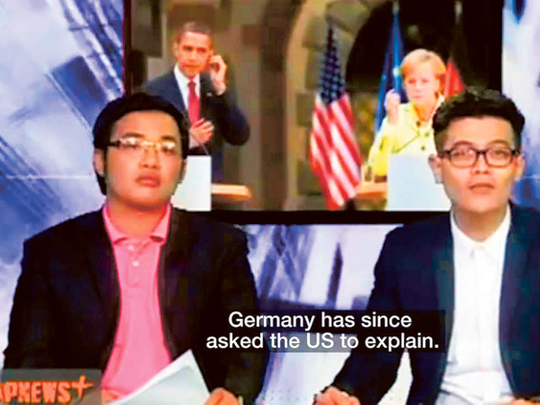
Dressed in a spotless suit and tie, anchor Tran Minh Phuong, 27, sits at a table against a backdrop of video footage in a style similar to television news across the world. But turn up the volume and it is clear what makes this bulletin very different — Phuong is rapping the news to a rousing hip-hop beat.
“Many young people don’t pay attention to the news,” he says from the sofa of a smart air-conditioned office in downtown Hanoi. “They care more about the tabloids, stupid stuff about celebrities.”
Phuong is not a journalist — by day he works as a construction engineer. But in his free time he and two friends, freelance artist Vo Viet Phuong, 25, and salesman Nguyen Trong Duc, 27, are members of the Hanoi-based hip-hop band Da Lab.
In November the trio were invited by online news site Viet Nam Plus, which operates under the official Vietnam News Agency, to take part in a bi-weekly news programme aimed at making news more appealing to young people — Rap News Plus. Released via YouTube and local online platforms, Rap News Plus has attracted tens of thousands of views, with some editions watched over 500,000 times.
“We think music is the best way to communicate our message,” says Viet Nam Plus editor Le Quoc Minh. “If we put them in front of a newspaper, they don’t care. If we put them in front of the TV, they don’t really care. But if we give them something interesting then maybe they will like it.”
The Vietnamese press has a reputation for widespread self-censorship and poor quality control. Editors have to attend weekly meetings with officials from the propaganda department to discuss sensitive content.
But while there is no private media in Vietnam, most organisations are relatively financially independent from the state and are highly competitive, says Tran Le Thuy, director of the Hanoi-based Centre for Media and Development Initiatives.
“The Vietnamese media is also facing pressure to get readers and advertisements like any media in the world,” she says. “It’s a multimillion-dollar business, a vibrant, dynamic and influential media with over 800 outlets rather than a mere [Communist] party mouthpiece.”
With good infrastructure and growing smartphone penetration, Vietnam is the second-largest video consumption market in Southeast Asia, just behind Thailand, says Esther Nguyen, CEO of Pops Worldwide, the main licensee of Vietnamese music on YouTube.
The largest demographic is people aged between 13 and 25. “They are always looking for something new, something different that attracts them,” Nguyen says. For this reason, Viet Nam Plus is produced every two weeks to keep it fresh and interesting. Minh also regularly consults his 15-year-old daughter for her opinion on the show.
The production process takes four days. Journalists select a dozen topics and the three rappers write the lyrics, which are vetted by Viet Nam Plus editors. “We don’t swear, we don’t use slang words,” Minh says.
While this may seem a bit tame for an art form born in the ghettos of New York, it’s still hard to win the minds of Minh’s bosses at the notoriously conservative Vietnam News Agency.
“They don’t get it, they don’t understand,” Minh says.
The local hip-hop scene has changed since Vietnamese-American rapper Thai Viet G released “Vietnamese Gangs” in 1997 — a rap track the hip-hop community regard as the first in Vietnamese.
Since then, rap has gradually become a convention of popular music, but this official acceptability is in large part due to strict censorship, which excludes references to explicit violence and sensitive political issues. Underground rap, on the other hand, is shared mostly via the internet.
“The form of hip-hop itself isn’t seen as particularly negative by Vietnamese censors, it’s more the verbal content,” says ethnomusicologist Dr Barley Norton from Goldsmiths University, London.
“There’s an irreverence to much rap and there is often a generational irreverence as most young rappers don’t want to be like their parents,” he says.
There is no reason to ban rap music in Vietnam, but whether or not people like it is another matter, says Nguyen Van Tinh, director of the international cooperation department under the ministry of culture, sports and tourism. “Rap music is too noisy and the lyrics are hard to understand, so most Vietnamese people don’t like it,” he says, adding this is particularly true for older people like himself.
More than anything else, rap is about is “telling the truth”, says prominent Ho Chi Minh City-based rapper Nguyen Son, better known as Nah.
“People curse and talk dirty on the street all the time, I don’t see why people can’t be real and say it in music,” he says. “Realism is an art.”
To some extent, the rappers from Rap News Plus agree. “There are many rappers who rap about thug life on the street but for us we have our jobs, our families, we have our problems in ordinary life so we rap about our problems, our life, our people,” says engineer-turned-rapper Tran Minh Phuong .
Despite this, the band have been criticised by other musicians for not being “real” rappers. Not because they are rapping for a government-affiliated news agency, but because they have to compromise on word play and rhyme to make the lyrics easy to understand. “We have to keep it simple so people can follow the news,” artist Vo Viet Phuong says.
At the moment Rap News Plus is in the early stages and is not making a profit. Viet Nam Plus covers the costs of production, but the rappers are not paid something Minh hopes will change. Following its initial success, the challenge will be how long it can remain interesting to a generation with a short attention span.
Artist Phuong has other hopes too. “In the past people thought rap was something really negative,” he says. “I think if we can do something better, talk about the positive, then people will change how they view rap.”
–Guardian News & Media Ltd












